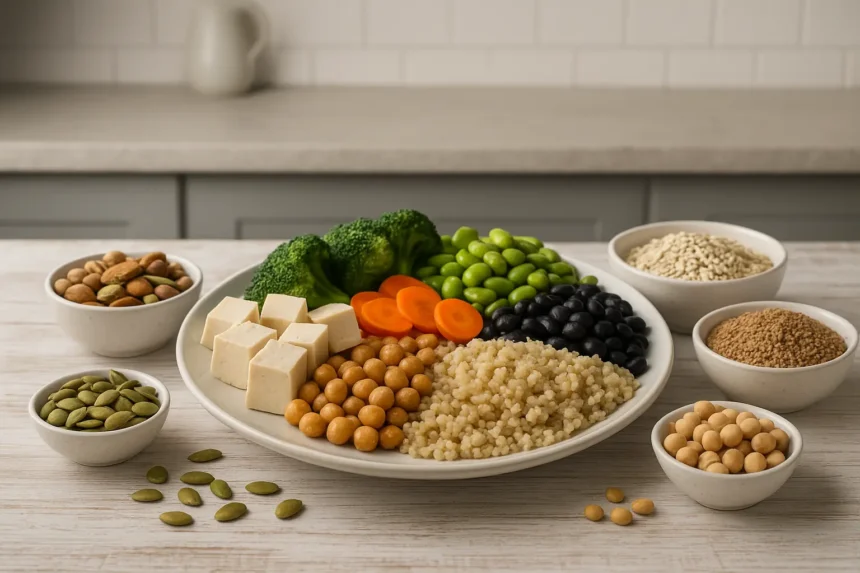A plant-based proteins balanced diet is one of the most effective ways to stay healthy, energized, and disease-free. Many people believe that only animal foods can provide enough protein, but the truth is — plant-based sources can meet your daily protein needs while also boosting heart health, digestion, and mental well-being. If you’ve been wondering which plant-based proteins to include in your daily diet, this article will give you a complete guide.
Why Plant-Based Proteins Matter in a Balanced Diet
Proteins are the building blocks of our body, essential for muscle growth, energy, immunity, and overall function. Choosing plant-based proteins not only helps reduce cholesterol and inflammation but also aligns with sustainable eating habits.
Key Benefits:
- Lower in saturated fat compared to animal proteins
- Rich in fiber for better digestion
- Packed with vitamins, minerals, and antioxidants
- Environmentally sustainable choice
Top Sources of Plant-Based Proteins for a Balanced Diet
1. Lentils
- One of the best protein-rich legumes.
- Provides ~18g protein per cup cooked.
- Great for soups, stews, and salads.
2. Chickpeas (Garbanzo Beans)
- Versatile protein source with ~15g protein per cup cooked.
- Can be used in hummus, curries, and roasted snacks.
3. Quinoa
- A complete protein containing all nine essential amino acids.
- Provides ~8g protein per cup cooked.
- Gluten-free and perfect for meal prep.
4. Tofu and Tempeh
- Derived from soybeans, both are excellent protein sources.
- Tofu provides ~10g protein per half cup, tempeh up to 15g.
- Can be stir-fried, grilled, or added to salads.
5. Black Beans
- Contains ~15g protein per cup cooked.
- High in fiber, iron, and folate.
- Excellent for burritos, bowls, and soups.
6. Peas
- A good source of ~9g protein per cup.
- Commonly used in vegan protein powders.
7. Nuts and Seeds (Almonds, Chia, Hemp, Sunflower)
- Offer 5–10g protein per serving.
- Provide healthy fats, omega-3s, and minerals.
8. Edamame
- Young soybeans, rich in protein (~17g per cup).
- A great snack option or salad topping.
9. Seitan (Wheat Gluten)
- One of the richest plant proteins (~25g per 3.5oz).
- Best for mock meats and high-protein vegan diets.
10. Oats
- Provides ~6g protein per cup cooked.
- Can be combined with nut butter or chia for extra protein.
How to Build a Balanced Meal with Plant-Based Proteins
- Breakfast: Oatmeal topped with chia seeds and almond butter
- Lunch: Quinoa salad with black beans and avocado
- Dinner: Tofu stir-fry with brown rice and vegetables
- Snack: Roasted chickpeas or edamame
📌 Internal Link Suggestions:
- [7 Common Mistakes People Make with Balanced Diets]
- [Top 10 Balanced Diet Foods for Boosting Energy Levels]
📌 Outbound Link Suggestions:
FAQs Section (Schema Style)
Q1: What are the best plant-based proteins for beginners?
A1: Lentils, chickpeas, quinoa, and tofu are the best beginner-friendly plant-based proteins.
Q2: Can plant-based proteins provide complete nutrition?
A2: Yes, when combined properly (e.g., rice + beans), they provide all essential amino acids.
Q3: Is quinoa really a complete protein?
A3: Yes, quinoa is one of the few plant-based complete proteins.
Q4: How much protein do I need daily on a plant-based diet?
A4: Adults generally need 0.8g of protein per kg of body weight. Plant-based diets can easily meet this requirement.
Q5: Are plant-based proteins better than animal proteins?
A5: Plant proteins are healthier for the heart and digestion, but animal proteins may have higher bioavailability. Balance is key.
Switching to a plant-based proteins balanced diet can be one of the most powerful steps toward better health, higher energy, and a sustainable lifestyle. From lentils to quinoa and nuts, these protein-packed foods can transform your meals into nutrient-rich powerhouses.
👉 Start small — add one or two plant-based proteins to your meals today and notice the difference.
📢 Don’t forget to share this article and check out more health tips on Healthwend.com.


